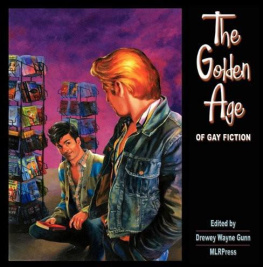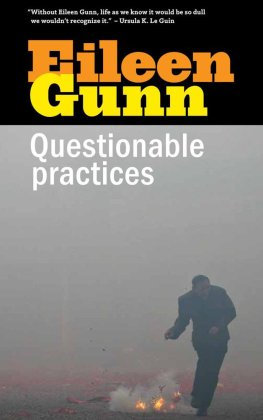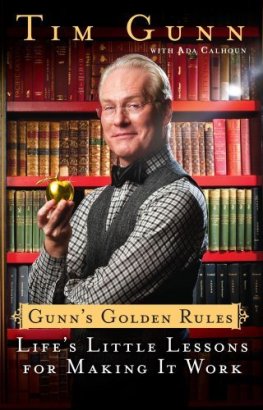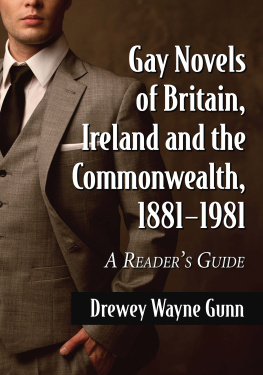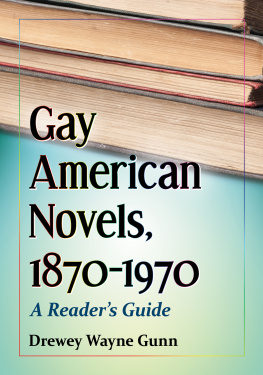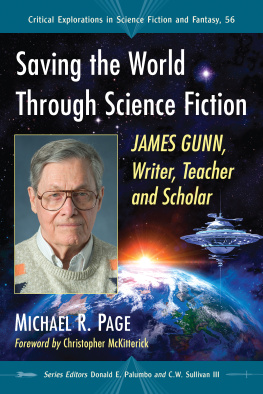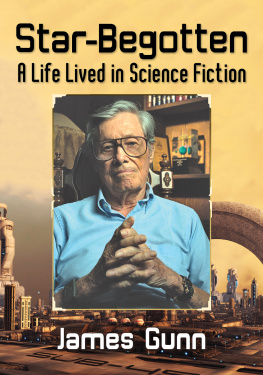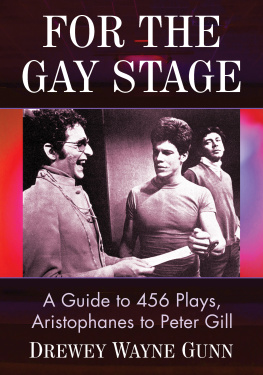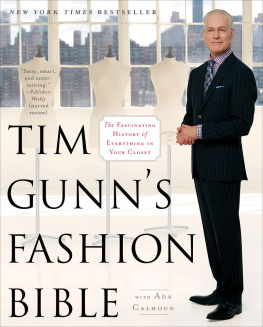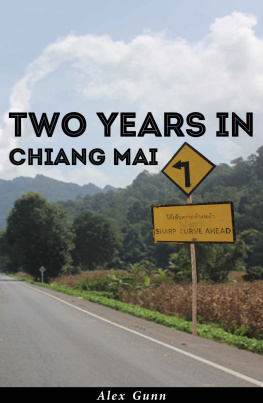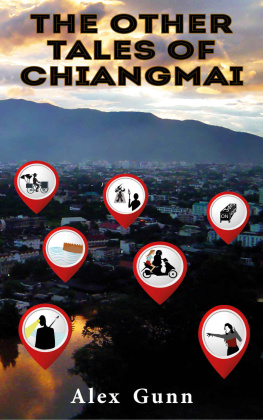DREWEY WAYNE GUNN (editor) - The Golden Age of Gay Fiction
Here you can read online DREWEY WAYNE GUNN (editor) - The Golden Age of Gay Fiction full text of the book (entire story) in english for free. Download pdf and epub, get meaning, cover and reviews about this ebook. year: 2009, publisher: Man Love Romance Press, genre: Art. Description of the work, (preface) as well as reviews are available. Best literature library LitArk.com created for fans of good reading and offers a wide selection of genres:
Romance novel
Science fiction
Adventure
Detective
Science
History
Home and family
Prose
Art
Politics
Computer
Non-fiction
Religion
Business
Children
Humor
Choose a favorite category and find really read worthwhile books. Enjoy immersion in the world of imagination, feel the emotions of the characters or learn something new for yourself, make an fascinating discovery.
- Book:The Golden Age of Gay Fiction
- Author:
- Publisher:Man Love Romance Press
- Genre:
- Year:2009
- Rating:5 / 5
- Favourites:Add to favourites
- Your mark:
- 100
- 1
- 2
- 3
- 4
- 5
The Golden Age of Gay Fiction: summary, description and annotation
We offer to read an annotation, description, summary or preface (depends on what the author of the book "The Golden Age of Gay Fiction" wrote himself). If you haven't found the necessary information about the book — write in the comments, we will try to find it.
The Golden Age of Gay Fiction — read online for free the complete book (whole text) full work
Below is the text of the book, divided by pages. System saving the place of the last page read, allows you to conveniently read the book "The Golden Age of Gay Fiction" online for free, without having to search again every time where you left off. Put a bookmark, and you can go to the page where you finished reading at any time.
Font size:
Interval:
Bookmark:
The best kind of literary criticism uncovers books you didnt know existed and inspires to you re-read the ones you did know about. By that measure, The Golden Age of Gay Fiction is a tremendous success. It is also eminently readable and entertaining and erudite while still remaining accessible. All in all, a landmark that reminds us our literary history did not begin after Stonewall but flourished in the decades before and that Stonewall was, in part, a product of that literature. Kudos to the editor, Drewey Wayne Gunn, and his very talented contributors!
Michael Nava , author of the Henry Rios mystery series
With this ambitious and important anthology of essays, The Golden Age of Gay Fiction , editor Drewey Wayne Gunn sets out to prove that todays authors of gay literature stand on the strong shoulders of our talented and daring brothers and sisters of the past. The collection succeeds beautifully as the contributors present a significant and well-considered critical perspective on the writings and writers that have helped to shape modern gay fiction. There is so much to value in this comprehensive work.
Ben Tyler , author of Tricks of the Trade
The Golden Age of Gay Fiction is a real eye-opener, as absorbing as the page-turning pulp novels it describes. Wayne Gunn and the other contributors have rewritten post-World War II social and literary history. Theyve restored a whole set of novels, writers, and publishers to their rightful place in American popular culture. Thank you!
John DEmilio , author of Intimate Matters: A History of Sexuality in America
Indispensable. Anyone interested in popular culture, queer culture or gay literary history will find this volume filled with fascinating details and discoveries. The Golden Age of Gay Fiction establishes a virtual canon of gay pulp fiction, analyzing the most important works and authors in the genre. It shows how queer writers could find a voice despite the legal, governmental and editorial restriction placed upon them, and in Victor J. Banis we find a new cultural hero.
David Bergman , author of The Violet Hour
No serious lover of vintage paperbacks and the history of the book can do without this keen and meticulous collection of an era gone by missed but not forgotten, gazed back on with nostalgic, sinful delight. Two thumbs up!
Michael Hemmingson , author of Bad Karma and Kinky Sex and Star Trek: A Post-Structural Critique
A fascinating grab bag of essays and articles about gay literature in the years before and immediately after Stonewall, a rich time of drugstore paperbacks, muscle magazines, backstreet publishers, mail-order porn, and literary surprises.
Christopher Bram , author of Gods and Monsters
The Golden Age of Gay Fiction belongs on every LGBT bookshelf, or on every gay persons Kindle, as an essential reference.
Ann Bannon , author of The Beebo Brinker Chronicles , in a review in el 46.
The Golden Age of Gay Fiction
The Golden Age was first
Ovid , Metamorphoses
EDITED BY DREWEY WAYNE GUNN
Copyright 2009 by MLR Press
All rights reserved.
Published by
MLR Press, LLC
3052 Gaines Waterport Rd.
Albion, NY 14411
Visit ManLoveRomance Press, LLC on the Internet:
www.mlrpress.com
Content Editing by Drewey Wayne Gunn
Production Editing by Judith David
Original Cover Art by Paul Richmond
Cover Design by Deana C. Jamroz
Internal Layout Design by Kris Jacen
Printed in the United States of America.
ISBN# 978-1-60820-049-9
First Edition 2009
Can you imagine The Last of the Mohicans as a gay novel? What about Hiawatha? Can you visualize an exploratory expedition in the wilds of the northwest, stumbling into a hidden valley of perpetual springtime populated by Indians, white trappers, renegade blacks, and varicolored cowpokes, all camping together in perfect harmony? A colony of heavily-hung beauties sucking and fucking their little hearts out for God and Country?
Angelo dArcangelo, The Homosexual Handbook (1968)
If you recognize the book which Angelo dArcangelo is describing, you are probably revealing either your age or your better-than-average knowledge of pre-Stonewall literature. Despite the novels recent reprint, I would imagine that the first gay best seller aimed almost exclusively at gay readers probably remains unknown today to the majority of the under-forty crowd. One of the aims of the present collection is to take notice of some works that are undeservedly slipping into obscurity, to correct some myths that have crept into literary history, to treat gay works published by mainstream houses and those brought out by their less respected cousins as all equally worth investigating, and to record the memories of some of the people who brought about a major revolution in gay publishing.
Theres nothing novel in saying that something new happened in gay American (and British) letters after World War II. Gregory Woods, for one, in his History of Gay Literature (1998) reminds us that the 1950s amounted to a virtual festival of queer self-assertion. Probably some of that fresh self-assurance came out of the experience of the war itself, during which gays, particularly those from rural areas or isolated parts of the city, suddenly realized they were not unique after all. Perhaps some of the assertiveness was actually a defense against the political climate we label McCarthyism. Woods continues, It was in the 1950s that homosexual men truly began to come out in the sense of emerging into the dominant culture in sufficient numbers to begin to transform the mainstream itself.
For those who divide everything into pre-Stonewall and post-Stonewall, there may be something novel in asserting, as Victor Banis convincingly does in his essay The Gay Publishing Revolution in Part II of this book, that the truly great literary breakout expressing this new spirit occurred in the 1960s a number of years before Stonewall erupted. It happened mostly in works written for paperback houses specializing in erotica, mostly located in California, although some were on the east coast. For many readers, the turning point was the novel dArcangelo is describing above: Song of the Loon by Richard Amory, published in 1966. Since gay scholars, for the most part, shy away from anything smacking of pornography and focus rather narrowly on texts brought out by approved publishing houses, the importance of this body of work, these pulps, remains largely unexplored. As a result, little attention has been paid to a crucial difference between most gay texts published before the early 1960s and almost all those published thereafter. That difference is embodied in the subtitle of this introduction.
First, about . Nothing new there. Characters whom we, through our contemporary lenses, read as gay/queer/sexually transgressive have populated stories for three millennia. We find examples in the Bible (David and Jonathan), in the oldest Western epics (Gilgamesh, Homers Achilles and Patroclus), in the Greek drama of Aristophanes (Agathon, Cleisthenes), in Petronius (Encolpius and Giton), in both Dantes Hell (Brunetto Latini) and his Purgatory (unnamed), in Chaucers comic Tales (the Pardoner and the Summoner), in Renaissance drama (Marlowes Edward II), in eighteenth-century novels (Smolletts Earl Strutwell), and in myriad examples throughout the nineteenth and early twentieth centuries. So the number of gay characters that popped up in the works of writers throughout the twentieth century was just part of a long tradition.
Next, by . Again, nothing new. We homosexuals, even before we had a label by which to name ourselves, were prone to justify our existence in the face of public scorn by listing eminent gays. These lists have always included some authors amid the politicians, military leaders, artists, and musicians. One usually finds mention of Plato, Virgil, Michelangelo, Marlowe, Bacon, Walpole, Byron, Melville, Whitman, Verlaine, Rimbaud, Wilde, Housman, Proust, Gide, Cocteau, Maugham, Crane, Cavafy, Garcia Lorca along with much argument about Shakespeare. So here too there was nothing unexpected, save their relatively greater openness, when Genet, Capote, Vidal, Williams, Baldwin, Pasolini, and Rechy came along. (One thing new in the twentieth century was gay fiction written by women such as Carson McCullers, Marguerite Yourcenar, Mary Renault, Iris Murdoch, and Patricia Nell Warren.)
Next pageFont size:
Interval:
Bookmark:
Similar books «The Golden Age of Gay Fiction»
Look at similar books to The Golden Age of Gay Fiction. We have selected literature similar in name and meaning in the hope of providing readers with more options to find new, interesting, not yet read works.
Discussion, reviews of the book The Golden Age of Gay Fiction and just readers' own opinions. Leave your comments, write what you think about the work, its meaning or the main characters. Specify what exactly you liked and what you didn't like, and why you think so.

